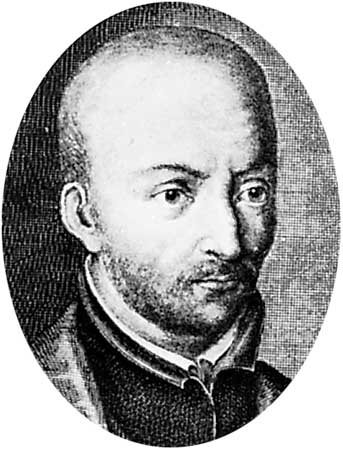Molina, Luis de
Spanish theologian
born September 1535, Cuenca, Spain
died Oct. 12, 1600, Madrid
 Spanish Jesuit who devised the theological system known as Molinism, which endeavoured to confirm that man's will remains free under the action of divine grace.
Spanish Jesuit who devised the theological system known as Molinism, which endeavoured to confirm that man's will remains free under the action of divine grace.Molina became a Jesuit at the University of Coimbra, Port. (1553), where he studied philosophy and theology (1554–62). He taught at Coimbra (1563–67) and at Évora (1568–83) and spent his last years writing.
Molina's works include his celebrated Concordia liberi arbitrii cum gratiae donis (1588–89; “The Harmony of Free Will with Gifts of Grace”), Commentaria in primam partem divi Thomae (1592; “Commentary on the First Part of 【the Summa of】 St. Thomas”), and De jure et justitia, 6 vol. (1593–1609; “On Law and Justice”).
Molinism led to a serious theological struggle between the Dominicans and the Jesuits for more than three centuries. Special assemblies at Rome (1598–1607) and other efforts to appease both sides failed. Molina in his Concordia aimed at a unified conception of divine justice and mercy, foreknowledge and divine guidance, predestination and condemnation, and grace and human freedom. The significance of his theory resided in its optimistic view of human nature, allowing for the possibility of sufficient grace—i.e., grace made effective by the assent of the recipient's will—and predestination in the expectation of the merits to be attained. His originality lay in the reformulation of traditional views on divine knowledge. There is a critical edition of the Concordia by J. Rabeneck (1953).
Additional Reading
Thomas P. Flint, Divine Providence: The Molinist Account (1998).
- Hyenia
- Hyesan
- Hygieia
- Hyginus, Gaius Julius
- Hyginus, Saint
- hygrometer
- Hyksos
- Hylas
- Hylobatidae
- hylomorphism
- hylozoism
- Hylton, R. Dale
- Hyman G. Rickover
- Hyman, Libbie Henrietta
- Hymans, Paul
- Hymen
- hymenium
- hymenomycetes
- Hymenophyllaceae
- hymenopteran
- hymenostome
- Hymettus, Mount
- hymn
- Hyndburn
- Hyndman, Henry Mayers